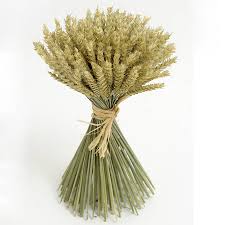记忆方法
1. 谐音“细缚”----细细地捆缚在一起。
2. shove => sheaf.
2. shove => sheaf.
中文词源
sheaf 一沓,一扎,一捆
来自古英语 sceaf,大捆,成捆,来自 Proto-Germanic*skauf,捆,丛,来自 PIE*skeup,捆,丛。 引申诸相关词义。
英语词源
- sheaf (n.)
- Old English sceaf (plural sceafas) "large bundle of corn," from Proto-Germanic *skauf- (cognates: Old Saxon scof, Middle Dutch scoof, Dutch schoof, Old High German scoub "sheaf, bundle," German Schaub "sheaf;" Old Norse skauf "fox's tail;" Gothic skuft "hair on the head," German Schopf "tuft"), from PIE root *(s)keup- "cluster, tuft, hair of the head." Extended to bundles of things other than grain by c. 1300. Also used in Middle English for "two dozen arrows." General sense of "a collection" is from 1728.
权威例句
- 1. He took out a sheaf of papers and leafed through them.
- 他拿出一沓报纸,匆匆翻阅了一下。
- 2. She moved the sheaf of papers into position.
- 她把那捆报纸挪到合适的地方。
- 3. The speaker came into the hall carrying a sheaf of notes.
- 演讲者带着一扎笔记走进大厅.
- 4. This essentially implies that the presheaf is a sheaf.
- 这实质上蕴含着预层是一个层.
- 5. He drew a sheaf of papers from his breast pocket.
- 他从上衣口袋里抽出一扎文件.
